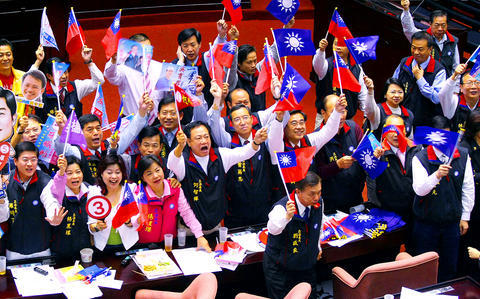The legislature approved the government budget for next year yesterday, although it cut an estimated NT$13.6 billion (US$418 million) by requiring government agencies to recoup money they pooled to help support campaign for the Democratic Progressive Party(DPP)-sponsored referendum on a UN bid using the name "Taiwan."
The lawmakers approved a budget totaling NT$1.68 trillion for next year. They also approved the budget on time, unlike the budget bill for the current fiscal year, which was initially boycotted by the pan-blue camp and passed several months later.
The legislature also passed a NT$70 billion defense budget earmarked for the Hsiung Feng-2E missiles and PAC-3 anti-missile system.

PHOTO: CNA
The legislature, however, slashed the budget by NT$5.7 billion and froze nearly half of the requested amount, or around NT$32.7 billion.
KMT Legislator Lin Yu-fang (
The Ministry of National Defense yesterday expressed astonishment and regret over the cut, emphasizing that it would postpone the deployment of necessary defense equipment.
The legislature also passed several binding resolutions backed by the KMT caucus as a package deal.
One resolutions requires all government agencies that gave money to the Government Information Office (GIO) for the UN referendum promotion to ask for their money back. They have to make the request 10 days before the end of the current fiscal year.
Agency heads who fail to obey the resolution risk being sued and forced to pay indemnification.
Another resolution requires the Central Election Commission (CEC) to hold the legislative and presidential polls and four referendums either by using a two-step voting procedure, or by issuing the referendum ballots separately from the election ballots.
That resolution will cause controversy because the CEC has decided to follow a one-step procedure for the Jan. 12 legislative elections and the referendums -- one initiated by the DPP on recovering the KMT's stolen assets and an anti-corruption referendum initiated by the KMT. Under this system, voters will receive their legislative and referendum ballots together when they enter a polling station.
The Cabinet has said any ballot cast through a two-step procedure would be considered invalid.
The resolution passed yesterday states that the CEC cannot refuse to provide a budget for local election commissions that use a two-step system.
CEC Secretary-General Teng Tien-yu (
Teng declined to comment when asked if the CEC would approve additional funding for two-step voting if local election commissions asked for more money.
"The commission has decided to employ the one-step voting scheme, and that's our set policy," Teng said.
Additional reporting by Loa Iok-sin, staff reporter and AP

A strong continental cold air mass is to bring pollutants to Taiwan from tomorrow, the Ministry of Environment said today, as it issued an “orange” air quality alert for most of the country. All of Taiwan except for Hualien and Taitung counties is to be under an “orange” air quality alert tomorrow, indicating air quality that is unhealthy for sensitive groups. In China, areas from Shandong to Shanghai have been enveloped in haze since Saturday, the ministry said in a news release. Yesterday, hourly concentrations of PM2.5 in these areas ranged from 65 to 160 micrograms per cubic meter (mg/m³), and pollutants were

Taiwan’s armed forces have established response protocols for a wide range of sudden contingencies, including the “Wan Chun Plan” to protect the head of state, the Ministry of Defense (MND) said today. After US President Donald Trump on Saturday launched a series of airstrikes in Venezuela and kidnapped Venezuelan President Nicolas Maduro, concerns have been raised as to whether China would launch a similar “decapitation strike” on Taiwan. The armed forces regularly coordinate with relevant agencies and practice drills to ensure preparedness for a wide range of scenarios, Vice Minister of National Defense Hsu Szu-chien (徐斯儉) told reporters before a

EVA Airways on Saturday said that it had suspended a pilot and opened an investigation after he allegedly lost his temper and punched the first officer several times as their plane was taxiing before takeoff at Los Angeles International Airport. According to a report published on Thursday by The Reporter, the incident occurred after the flight’s Malaysian first officer tried to warn the Taiwanese pilot, surnamed Wen (文), that he was taxiing faster than the speed limit of 30 knots (55.6kph). After alerting the pilot several times without response, the first officer manually applied the brakes in accordance with standard operating

Japanese Councilor Hei Seki (石平) on Wednesday said that he plans to visit Taiwan, saying that would “prove that Taiwan is an independent country and does not belong to China.” Seki, a member of the Japan Innovation Party, was born in Chengdu in China’s Sichuan Province and became a naturalized Japanese in 2007. He was elected to the House of Concilors last year. His views on the Chinese Communist Party (CCP) — espoused in a series of books on politics and history — prompted Beijing to sanction him, including barring Seki from traveling to China. Seki wrote on X that he intends